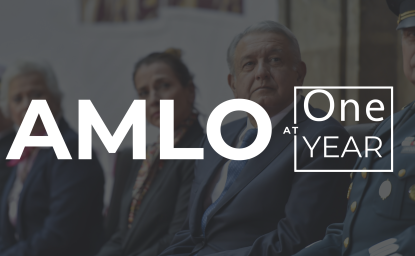“El que avisa no traiciona” (He who warns you can´t betray you) is a motto that Mexicans are using a lot these days when they discuss the policies of their president, Andrés Manuel López Obrador (AMLO). For even when his decisions seem impetuous or improvised, there are very few things he does that he hasn’t announced at some point in the recent past.
This is not to say that his policies are particularly well designed or properly implemented. Neither does it mean that he is delivering the desired results. Rather, the point is that AMLO “warns” and, therefore, he cannot be criticized for “betraying”, that is, for not keeping his word or changing his mind. The thesis expressed by the saying is, in the end, that there is no room for surprise: AMLO has done what he said he was going to do.
There is a multitude of examples to support such a thesis. His cancellation, in spite of the billions of dollars in termination costs, of a long-planned new airport in Mexico City. His layoffs, at the expense of his government’s own administrative capacities, of public servants with experience and expertise. His reallocation of resources to finance more social policy programs, despite the lack of measures to guarantee the quality of such spending. His energy policy’s concentration on oil, in open disregard for its environmental effects and with no viable business plan. His hostility towards autonomous agencies, particularly against the National Electoral Institute, even though it oversaw the least contested election in Mexican democratic history, that is, the very election that made López Obrador president. In sum, to say it with an expression Americans will surely find familiar, AMLO is not “pivoting”.
Nevertheless, there is a very emblematic and telling case that contradicts the argument that AMLO has done exactly what he said he was going to do: the relationship with the United States. In no other area has it been so obvious that AMLO has had to change, to act in a way that is different from what his rhetoric anticipated. This is, perhaps, the greatest deterrent, the strictest constraint, the most import restriction that AMLO has had to reckon with during his first year in office.
Before the presidential campaign of 2018, AMLO used to be very critical of Trump’s hostility towards Mexico and Mexicans, of his immigration policy, and of what he called the “complicit silence” of then-president Peña Nieto. He even published a book, (Listen Trump: Proposals and Actions in Defense of Immigrants in the United States) in which he used strong adjectives for Trump and his supporters –demagogues, xenophobes, neofascists– and promised he would act “in defense of the Human Rights both of Mexican nationals and of immigrants from all over the world.” He also vowed he would oppose “the building of the wall, deportations and unilateral or abusive decision-making in free trade matters.” And in the second presidential debate he even said that if the Mexican president was honest and had moral authority, Trump would learn to respect Mexico.
During the first months of his presidency, AMLO started to adopt a new policy towards Central American migration, which was rightly characterized as more open, just, and humanitarian. Yet, when AMLO´s policy towards Mexico’s Southern border started creating problems with the U.S. because of its effects in Mexico’s Northern border, Trump threatened to impose tariffs to Mexican products if AMLO didn’t do significantly more to reduce those new migration flows. The Mexican president conceded immediately and abandoned his initial policy to adopt another one much more in accordance with Trump’s requests.
Recently, after the massacre of nine members of the LeBaron familily in Chihuahua, Trump has launched a new threat: to designate drug trafficking cartels as terrorist organizations. As some observers have already written, it is unlikely that he will do it, but he will almost certainly weaponize the threat in order to demand changes in AMLO’s so-called “pacifist” security policy. Will AMLO concede again?
In the context of his first year in power, and compared with other formal and informal checks and balances (whether it is the Judicial Power, the press, Congress, civil society, the “markets”, the bureaucracy or the private sector), it is evident that there is no other instance that imposes more effective limits to AMLO’s project, the self-labeled “Fourth Transformation”, than the relationship with the United States. In no other issue has AMLO had to walk back so much from what he said, even at the cost of eating his own words or breaking his promises, as with the President of the United States.
This is what Mexican democracy looks like today: the most significant check on the Mexican president´s power is Donald Trump.
Opinions expressed here are solely those of the author.
Author


Mexico Institute
The Mexico Institute seeks to improve understanding, communication, and cooperation between Mexico and the United States by promoting original research, encouraging public discussion, and proposing policy options for enhancing the bilateral relationship. A binational Advisory Board, chaired by Luis Téllez and Earl Anthony Wayne, oversees the work of the Mexico Institute. Read more

Explore More
Browse Insights & Analysis
AMLO at One Year

Greenland’s New Governing Coalition Signals Consensus


